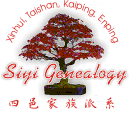

Tuesday, December 19, 2000
Globe and Mail
VANCOUVER -- With their numbers dwindling each year, Chinese Canadians who had to pay a head tax to enter the country a lifetime ago are suing the federal government to try to get redress for the discriminatory practice.
The claim, which would total more than $1-billion, comes after years of trying to put political pressure on Ottawa for compensation and an apology for the country's mistreatment of Chinese immigrants.
"The head-tax payers cannot wait any longer," Yuen Hing Tse, executive director of the Chinese Canadian National Council, said at a news conference in Vancouver yesterday. She added that many are in their nineties.
For years, Canada treated Chinese immigrants differently than it treated those from other countries. They were not permitted to vote, they could not bring in wives from their homeland, and most of these long-ago immigrants were forced to pay the government a head tax to arrive in Canada.
Yesterday, the council announced that three Chinese Canadians, who will represent all families who had to pay a head tax or put up with a blatantly racist exclusion act passed by the government, have filed a statement of claim in Ontario Court to force Ottawa to make amends.
The statement of claim, which contains allegations that have yet to be proven in court, states that the government collected approximately $23-million at the time from Chinese head-tax payers. Today, that is equivalent to more than $1-billion plus interest.
To stem immigration from China, the federal government imposed a $50 head tax in 1885, shortly after Chinese labourers were no longer required to toil on the Canadian Pacific Railway. This tax for entering the country was raised to $100 in 1890 and $500 in 1904. Immigrants from other countries paid nothing.
Then came the Chinese Immigration Act, an even harsher law, passed in July, 1923, at the urging of the British Columbia government. The act barred Chinese from entering Canada, preventing wives in China from joining their husbands.
The representative plaintiffs are:
Shack Jang Mak, 93, now in a nursing home near Toronto. "He and his wife were separated for 22 years because of the exclusion act, and he paid the head tax," council president May Cheng said.
Quen Ying Lee, 89, widow of Sudbury restaurateur Guang Foo Lee, who paid the $500 tax as a young man but was unable to bring her and their children to Canada until he was in his fifties.
Their son Yew Lee, 50, of Chelsea, Que.
Mr. Lee, named to represent the descendants of those affected by the measures, said his parents lived on separate continents for 20 years and were completely out of communication while war and famine ravaged China between 1937 and the late 1940s. "I guess she put her faith in him coming back, she was faithful to the marriage, and my father had faith in Canada as a place for a new life," he said.
The council registered 2,600 claimants in 1984 and Ms. Tse said more surviving head-tax payers, spouses and descendants will join the lawsuit.